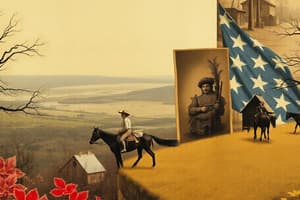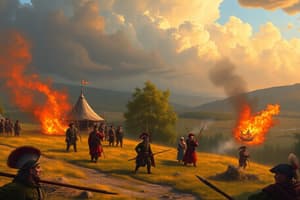Podcast
Questions and Answers
Which factor most significantly fueled the competition between Britain and France in North America during the period leading up to the French and Indian War?
Which factor most significantly fueled the competition between Britain and France in North America during the period leading up to the French and Indian War?
- Desire for territorial expansion and access to resources. (correct)
- Religious differences and missionary activities.
- Availability of advanced military technology.
- Control over key waterways for naval dominance.
How did the French strategy of preserving forests to protect fur-bearing animals affect their relationship with Native American tribes?
How did the French strategy of preserving forests to protect fur-bearing animals affect their relationship with Native American tribes?
- It led to conflicts with tribes who relied on agriculture.
- It strengthened alliances with tribes dependent on the fur trade. (correct)
- It resulted in treaties that granted France exclusive hunting rights.
- It caused widespread famine among tribes.
What was the primary motivation behind the Iroquois Confederacy siding with the British in the French and Indian War?
What was the primary motivation behind the Iroquois Confederacy siding with the British in the French and Indian War?
- Retaliation against the Huron for past conflicts. (correct)
- Long-standing trade agreements that favored British merchants.
- Fear of French military strength.
- A promise of greater territorial control after the war.
In what way did the expansionist activities of the British colonies of Virginia and Pennsylvania contribute to the outbreak of the French and Indian War?
In what way did the expansionist activities of the British colonies of Virginia and Pennsylvania contribute to the outbreak of the French and Indian War?
Why did George Washington's initial mission to strengthen a British outpost in 1754 ultimately escalate into military conflict with the French?
Why did George Washington's initial mission to strengthen a British outpost in 1754 ultimately escalate into military conflict with the French?
How did the French victory at Fort Oswego impact the strategic balance of power in the Great Lakes region?
How did the French victory at Fort Oswego impact the strategic balance of power in the Great Lakes region?
What role did William Pitt play in reversing the tide of the French and Indian War in favor of the British?
What role did William Pitt play in reversing the tide of the French and Indian War in favor of the British?
How did the British military's adaptation of wilderness fighting tactics influence the outcome of the French and Indian War?
How did the British military's adaptation of wilderness fighting tactics influence the outcome of the French and Indian War?
Why was the city of Quebec a strategically important target for the British during the French and Indian War?
Why was the city of Quebec a strategically important target for the British during the French and Indian War?
What was the significance of the Treaty of Paris in 1763 in reshaping the political landscape of North America?
What was the significance of the Treaty of Paris in 1763 in reshaping the political landscape of North America?
What was Pontiac's primary objective in launching attacks against British settlements after the French and Indian War?
What was Pontiac's primary objective in launching attacks against British settlements after the French and Indian War?
How did the Proclamation of 1763 aim to prevent further conflicts between colonists and Native Americans, and what were its consequences?
How did the Proclamation of 1763 aim to prevent further conflicts between colonists and Native Americans, and what were its consequences?
What was the significance of the Sugar Act in the context of growing tensions between Britain and its American colonies?
What was the significance of the Sugar Act in the context of growing tensions between Britain and its American colonies?
Why did the Stamp Act provoke such strong opposition from the colonists, even more so than previous taxes imposed by the British?
Why did the Stamp Act provoke such strong opposition from the colonists, even more so than previous taxes imposed by the British?
How did the Sons of Liberty contribute to the growing unrest in the American colonies leading up to the Revolution?
How did the Sons of Liberty contribute to the growing unrest in the American colonies leading up to the Revolution?
What underlying issue did Patrick Henry champion in his opposition to British tax laws, which resonated deeply with many colonists?
What underlying issue did Patrick Henry champion in his opposition to British tax laws, which resonated deeply with many colonists?
How did the experience of fighting alongside one another during the French and Indian War influence the colonists' sense of unity and ability to challenge British authority?
How did the experience of fighting alongside one another during the French and Indian War influence the colonists' sense of unity and ability to challenge British authority?
How did the colonists' perception of their relationship with Britain evolve after the French and Indian War?
How did the colonists' perception of their relationship with Britain evolve after the French and Indian War?
What shift in colonial sentiment regarding their future relationship with Britain occurred in the aftermath of the French and Indian War?
What shift in colonial sentiment regarding their future relationship with Britain occurred in the aftermath of the French and Indian War?
What lasting impact did George Washington's early military experiences during the French and Indian War have on his later role in the American Revolution?
What lasting impact did George Washington's early military experiences during the French and Indian War have on his later role in the American Revolution?
Flashcards
Cause of Conflict
Cause of Conflict
Britain and France competed for land and power.
Colonist Land Needs
Colonist Land Needs
British colonists desired more land for farming.
French Forest Preservation
French Forest Preservation
The French wanted to preserve forests for fur-bearing animals.
Ohio River Valley Conflict
Ohio River Valley Conflict
Signup and view all the flashcards
New France Areas
New France Areas
Signup and view all the flashcards
Iroquois Confederacy
Iroquois Confederacy
Signup and view all the flashcards
Iroquois-British Alliance Reason
Iroquois-British Alliance Reason
Signup and view all the flashcards
Huron and Algonquin
Huron and Algonquin
Signup and view all the flashcards
Native American Goals
Native American Goals
Signup and view all the flashcards
British Colonies Moving West
British Colonies Moving West
Signup and view all the flashcards
George Washington's 1754 Mission
George Washington's 1754 Mission
Signup and view all the flashcards
French renaming of outpost
French renaming of outpost
Signup and view all the flashcards
Fort Necessity
Fort Necessity
Signup and view all the flashcards
Beginning of French and Indian War
Beginning of French and Indian War
Signup and view all the flashcards
Washington's Feelings Post-Battle
Washington's Feelings Post-Battle
Signup and view all the flashcards
French wilderness fighting
French wilderness fighting
Signup and view all the flashcards
General Braddock
General Braddock
Signup and view all the flashcards
British Soldiers Near Fort Duquesne
British Soldiers Near Fort Duquesne
Signup and view all the flashcards
General Montcalm
General Montcalm
Signup and view all the flashcards
Montcalm's Victory
Montcalm's Victory
Signup and view all the flashcards
Study Notes
- The French and British were fighting to control land and power in North America
- Colonists wanted farmland, but the French wanted to protect forests for fur-bearing animals
- Competition for land and resources in the Ohio River Valley largely caused the conflict
- New France included modern Canada and Louisiana
Native American Alliances
- The Iroquois sided with the British because the Huron had helped their rivals
- The Huron and Algonquin allied with the French
- Native Americans wanted to protect their land and way of life
- British colonies of Virginia and Pennsylvania moved west into the Ohio River Valley
Early Battles
- George Washington was sent to strengthen a British outpost in 1754
- The French seized the British outpost and renamed it Fort Duquesne
- George Washington built Fort Necessity
- The French and Indian war began after the battle at Fort Necessity
- George Washington felt ashamed and defeated after the battle
French Victories
- French allies taught soldiers to use ambush attacks from behind trees and rocks
- General Braddock suffered a fatal wound in battle
- Many British soldiers were killed or wounded during the 1755 ambush near Fort Duquesne
- General Montcalm led the French to capture Fort Oswego
- This win gave the French control of Lake Ontario
Turning Point
- William Pitt encouraged Britain to send more money and troops
- The British changed the course of war after learning wilderness fighting tactics
- Fort Duquesne was renamed Fort Pitt
- The city of Pittsburgh was built around Fort Pitt
- Montreal was the last French stronghold to be surrendered
Quebec and the End
- Quebec’s position was atop cliffs above the St. Lawrence River
- James Wolfe led the British attack on Quebec with 9,000 soldiers
- Wolfe, commander of the British, and Montcalm, commander of the French, were both fatally wounded in battle
- The Treaty of Paris ended the French and Indian war
Aftermath and Pontiac’s War
- Pontiac was a Native American leader
- Pontiac aimed to protect Native lands from British settlers
- Pontiac organized attacks in 1763 in his homeland of northern Ohio and Michigan
- Pontiac's War concluded in 1764 with a peace agreement
Proclamation and New Taxes
- King George III issued the Proclamation of 1763 to prevent more conflict with Native Americans
- The Proclamation of 1763 set aside land west of the Appalachian Mountains for Native Americans
- Colonists wanted this land and were angry about the Proclamation
- The Sugar Act taxed sugar in the colonies
- Colonists who didn’t pay the tax were fined and tried without juries
Colonial Reactions
- The Stamp Act taxed printed materials
- Colonists were opposed because they had no representation in Parliament
- The Sons of Liberty protested the Stamp Act in Boston
- The Sons of Liberty met under the Liberty Tree
- Patrick Henry strongly opposed the tax laws
Growing Unrest
- Colonists wanted more control and independence
- Colonists learned from the war that they could unite
- George Washington called the sound of bullets in his coat "charming"
- After the war, colonists viewed their relationship with Britain as more independent, but frustrating
- After the war, colonists began to support the idea of breaking away from Britain
Studying That Suits You
Use AI to generate personalized quizzes and flashcards to suit your learning preferences.




